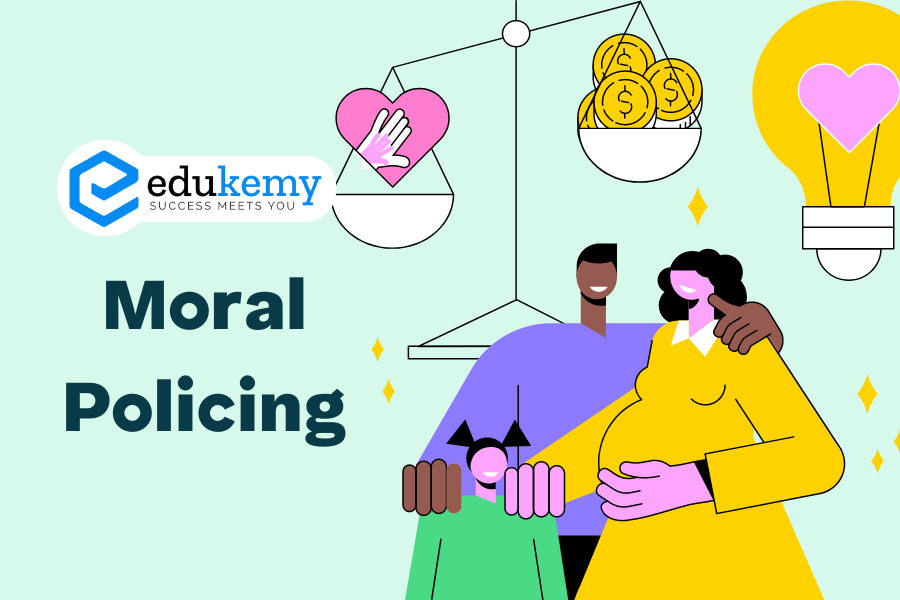
Definition of Moral Policing: Moral Policing, in its broadest context, refers to a system where stringent surveillance and restrictions are imposed on individuals who allegedly violate the fundamental norms of our society. These norms are deeply rooted in cultural values, age-old customs, and religious doctrines.
Characteristics of Moral Policing: Mob Lynching: This violent manifestation involves a mob, claiming to dispense justice without due process, executing an assumed offender. It often includes torture and physical mutilation.
- Cow Vigilantism: Acts carried out in the name of Cow Protection, such as lynching, pose a significant threat to the nation’s secular fabric. The killing of individuals merely on suspicion of beef consumption reflects the intolerance prevalent among the vigilantes.
- Cultural Terrorism: Non-constitutional entities, like Anti Romeo Squads, employ physical violence to enforce their subjective beliefs, constituting a form of cultural terrorism.
- Honor Killing: Extreme instances of moral policing, honor killings, aim to restrict Western influences by encroaching upon individual freedom.
Contents
Factors Contributing to Moral Policing:
- Religious Values: Within the Hindu religion, cows hold sacred significance as symbols of life and are revered. This reverence occasionally leads to Cow vigilantism, where the majority may target the minority, presuming their regular consumption of bovine meat.
- Social Networking Platforms: Platforms such as WhatsApp and Facebook serve as catalysts for moral policing by amplifying the dissemination of fake news. This can result in events like lynching and communal clashes.
- Patriarchy: Individuals with a patriarchal mindset often perceive the security of women as their responsibility, viewing them as the weaker sex. Consequently, restrictions may be imposed on women in terms of speech, attitude, clothing, and public behavior.
- Police Overreach: Law enforcement agencies, vested with exceptional powers, sometimes overstep their boundaries. For instance:
- Section 292 of the Indian Penal Code (IPC) criminalizes materials deemed obscene, lacking a clear definition of obscenity. Police misuse this section to file cases against film posters and advertisements, undermining artistic creativity and restricting freedom of expression.
- The Immoral Traffic (Prevention) Act (PITA), initially enacted to combat human trafficking, is at times utilized by the police to conduct raids on hotels without proper evidence, causing embarrassment to legal couples and young individuals.
Impact of Moral Policing:
- Promotion of Conservatism: Acts of moral policing hinder the overall development of society by strictly enforcing traditional gender roles, fostering conservatism.
- Gender Bias: Moral policing exacerbates gender bias, restricting the freedom and independence of women in society. For example, aggressive groups issuing mandates against women wearing Western clothing.
- Violation of Fundamental Rights: Cultural groups, by imposing their values, have repeatedly demonstrated disregard for democracy and the fundamental rights of Indian citizens that do not align with their cultural ideals.
- Rising Intolerance: Moral policing leaves no room for diversity and tolerance, fueling conflicts and altercations in society.
- Impact on Educational Institutions: Vigilante groups within educational institutions monitor and restrict students’ activities, claiming to uphold a moral standard.
- Mob Lynchings: Collective hate crimes, such as lynching, are fueled by the spread of fake rumors on social media, compounded by the inactivity of politicians and law enforcement.
- Cultural Terrorism: Extra-constitutional actors, including political outfits and cultural groups, employ physical violence to impose their subjective beliefs. Such actors exhibit coercive and arbitrary behavior.
- Honor Killings: This heinous offense is psychologically complex and sociologically intricate, representing a morally distressing crime against humanity.
- Cow Vigilantism: Posing a threat to minority communities like Muslims and Dalits, cow vigilantism is on the rise, as reported, endangering lives and fostering an environment of fear.
FAQs
Q: What is moral policing?
Moral policing refers to the act of enforcing certain moral standards or behaviors in society, often through vigilantism or authoritative measures. It involves individuals or groups imposing their subjective moral beliefs on others, typically targeting behaviors they deem as immoral or inappropriate.
Q: What are some examples of moral policing?
Examples of moral policing include harassing couples for displaying affection in public, dictating dress codes based on subjective moral standards, condemning individuals for their lifestyle choices (such as smoking, drinking, or partying), and censoring artistic expressions deemed offensive by certain groups.
Q: Why is moral policing problematic?
Moral policing infringes upon individual freedoms and rights, such as the freedom of expression and the right to privacy. It fosters intolerance and stifles diversity by imposing one group’s moral standards on everyone. Additionally, it can lead to social discord, harassment, and violence against those who do not conform to these standards.
Q: Who typically engages in moral policing?
Moral policing can be perpetrated by various actors, including conservative religious groups, extremist organizations, self-appointed moral guardians, and even law enforcement agencies in some cases. These groups often justify their actions based on cultural or religious beliefs, claiming to uphold societal values or protect public decency.
Q: How can we address moral policing?
Addressing moral policing requires a multi-faceted approach involving education, awareness campaigns, legal reforms, and community engagement. It’s essential to promote tolerance, respect for diversity, and the recognition of individual rights. Strengthening laws against vigilantism and harassment, as well as promoting dialogue between different societal groups, can help mitigate the harmful effects of moral policing.
In case you still have your doubts, contact us on 9811333901.
For UPSC Prelims Resources, Click here
For Daily Updates and Study Material:
Join our Telegram Channel – Edukemy for IAS
- 1. Learn through Videos – here
- 2. Be Exam Ready by Practicing Daily MCQs – here
- 3. Daily Newsletter – Get all your Current Affairs Covered – here
- 4. Mains Answer Writing Practice – here

